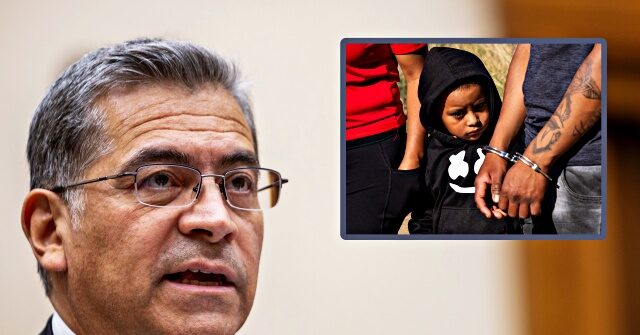Health and Human Services (HHS) Secretary Xavier Becerra confronted intense scrutiny regarding his management of unaccompanied alien children (UACs) during a recent congressional hearing. Under his administration, a staggering 365,705 UACs were released into the United States from Fiscal Year 2021 to Fiscal Year 2023. This alarming number stands in contrast to approximately 83,100 UACs released during the last two fiscal years of the Trump administration. Faced with pointed questions from Rep. Tom Tiffany (R-WI) about the fate of 320,000 children who remain unaccounted for, Becerra maintained that his team works diligently to enhance the protective measures for these vulnerable youths while asserting that he wouldn’t alter past decisions or policies.
The hearing exposed significant gaps in oversight and tracking of UACs after their release to adult sponsors within the U.S. A report by the HHS Inspector General (IG) disclosed that many of these children are not attending required immigration court hearings, raising concerns about their safety. Nearly 32,000 UACs failed to appear for their immigration court hearings. Worryingly, ICE has not issued Notices to Appear (NTAs) to over 291,000 of these children, which further undermines the efforts to monitor their well-being. This lack of follow-through leaves UACs vulnerable to potential trafficking, exploitation, and forced labor—issues that are exacerbated by the structural deficiencies within the current immigration framework.
Rep. Chip Roy (R-TX) pressed Becerra to confirm the whereabouts and safety of the vast number of children who have gone missing, highlighting the stark reality that no comprehensive tracking system is in place. Becerra’s response reflected a limited capacity to ensure the safety of children once they are handed over to vetted sponsors. The concern is not just bureaucratic; it has real-world implications for the lives of these vulnerable children. The data presented suggests a troubling trend towards increased child trafficking, with the Labor Department reporting an 88 percent rise in child labor trafficking cases from Fiscal Year 2019 to Fiscal Year 2023.
Compounding these issues, a HHS whistleblower testified last year that the agency has been inadvertently facilitating a “multi-billion-dollar child trafficking operation.” These revelations have raised alarms about the potentially exploitative nature of adult sponsorship and the conditions faced by UACs after they leave HHS custody. The claim emphasizes the pressing concern that some sponsors may view these children merely as commodities, which has led to a disturbing increase in reports of labor trafficking. As many as 6,000 children—predominantly UACs—were discovered working in perilous conditions last year, underscoring the gravity of the situation.
In the wake of these revelations, the HHS finds itself at a crossroads, where its policies and practices are under intense scrutiny from lawmakers, advocates, and the public alike. The agency’s inability to maintain adequate oversight of the children it releases raises questions about its capacity to protect this vulnerable population effectively. Becerra’s assertion that his administration is committed to mitigating risks and ensuring the safety of UACs does not resonate when juxtaposed with the stark data presented during the hearing. The lack of accountability and effective monitoring mechanisms in place for unaccompanied minors serves as a stark warning that reforms are urgently needed.
As the situation develops, there are calls for greater accountability from HHS to prevent further exploitation of UACs and ensure their safety in the United States. The evidence suggesting systemic failures within the current framework is troubling and requires immediate action from both the agency and Congress. Without interventions, the potential for continued harm to these children remains high, and the challenges surrounding unaccompanied minors are unlikely to be resolved without a comprehensive reassessment of HHS’s strategies and policies to safeguard their welfare.

